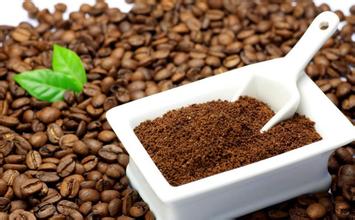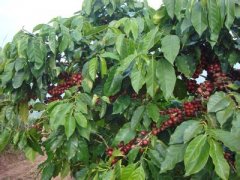A brief introduction to the treatment method of grinding degree and baking degree of Yunnan small-grain coffee Huaguoshan coffee

The average temperature of Lujiangba in Baoshan is 21.5℃, and the highest is 40.4 ℃, which is basically frost-free all the year round. It is recognized as the best producing area of small-grain coffee. The small-grain coffee cultivated here is famous at home and abroad for its strong but not bitter, fragrant but not strong, well-proportioned small noodles, mellow and fruity.
In recent years, the planting area of small-grain coffee in other producing areas of Yunnan has been expanding, the quality has also made great progress, and the popularity of small-grain coffee has been improved both at home and abroad.
After inspecting the coffee planting and primary processing base in Yunnan, international coffee organization tasting experts rated Yunnan coffee as the kind of small seed coffee processed by Colombian wet processing, which is the highest quality coffee in the world. Pu'er, Xishuangbanna, Wenshan, Baoshan, Dehong, Lincang and other places in the south and west of Yunnan are all the distribution areas of small-grain coffee in Yunnan. As of January 1, 2012, according to the comprehensive survey of Yunnan Province, the planting area of coffee in Yunnan has exceeded 800000 mu, and the output of coffee beans in this period is expected to exceed 55000 tons. For the future, local governments in Yunnan have also drawn a blueprint: Dehong is planning to expand the coffee planting area from the current 100000 mu to 200000 mu in the next few years; Lincang plans to expand the existing 20, 000-mu coffee forest by 10 times to 200000 mu in the 12th five-year Plan; and Pu'er also plans to expand the 220000 mu coffee forest to 600000 mu. Other areas suitable for coffee cultivation, such as Baoshan and Xishuangbanna, are also planning to expand the planting scale. The western and southern parts of Yunnan Province are located between 15 °N and the Tropic of Cancer, most of which are 1000-2000 meters above sea level, and the topography is dominated by mountains and slopes. Here, with fertile land, sufficient sunshine, rich rainfall and large temperature difference between day and night, the unique natural conditions have formed the particularity of Yunnan small seed coffee taste-strong but not bitter, fragrant but not strong, slightly fruity.
Coffee production in Yunnan is wet, that is, peeling after picking ripe coffee fruits (generally required within 24 hours after picking), fermentation (depending on the weather, air temperature, and the number of coffee fruits in the same batch, usually 12-24 hours), washing (washing off the sticky substances attached to coffee beans), water washing and grading (beans with different plumpness pass through a trough with a certain slope Coffee shells, shrunken beans and beans with poor plumpness are the first to rush out of the sink. The beans with the best plumpness are at the end. Then, most of the coffee in Yunnan is sold to Nestl é, Maxwell, Starbucks and other enterprises in accordance with the contract, and the coffee bean production standards are currently based on the standards of the above-mentioned enterprises. The moisture content is 11.4%, the price is 12.5%, and the rate of good beans is 98%. The coffee provided by our shop is AA grade coffee, that is to say, it is higher than the standard of the enterprise. After being graded by a large color sorter, the ground coffee beans are graded manually. The amusement rate reached 99.9%. What on earth is AA?
Actually, in terms of taste, I've tried it myself. Class B round Arabica coffee beans taste more mellow. But from a traditional point of view, AA means that coffee beans are big enough. One coffee fruit that produces two beans is a soybean variety. If you can become A, you must be a variety with single fruit and double beans. So if you see that spherical beans are called Grade A, that's nonsense.
The quality of coffee depends on many factors, such as growing environment, climate, cultivation and management techniques and so on. Its best growing environment is low latitude, high altitude, sufficient rainfall and suitable sunshine, so the north latitude is 15. The ideal growing area for coffee is between the Tropic of Cancer and the Tropic of Cancer. However, other areas in this zone, such as Hawaii and Saudi Arabia in the United States, or low altitude or little rain in the desert, are not conducive to coffee growth, only southern Yunnan in this zone happens to have all kinds of conditions. According to the determination of experts, small seed coffee should be planted in the mountains at an altitude of 800 to 1800 meters. If the altitude is too high, it will taste sour, and if it is too low, it will taste bitter. Yunnan coffee is mostly planted in dry and hot valleys at an altitude of 1100 meters above sea level, so it has a moderate sour taste, rich and mellow aroma. In terms of climatic conditions, the long light time in southern Yunnan is conducive to plant growth and photosynthesis, and the large temperature difference between day and night and low temperature at night are conducive to the accumulation of coffee nutrients. Therefore, the effective nutrients of Yunnan small-grain coffee are higher than those of other foreign coffee varieties. Small seed coffee is easy to be infected with rust, and the yield and quality of embroidery disease are deeply affected. In the hot area of Yunnan, due to the distinct dry and wet, the red ripening of fresh fruit enters the dry season every year, and the relative humidity is low, which is not conducive to the formation and growth of rust blister. Due to the excellent quality of Yunnan coffee, it entered the London market with "Lujiang No.1" in the 1960s and was rated as first-class. In recent years, the world-famous coffee companies such as Nestle and McDonnell have come to Yunnan to open up raw material bases, and the products produced in Yunnan are also gradually famous at home and abroad. At present, the average yield of coffee in Yunnan has reached 96.4 kg, and a household contracted land in Lujiang has set a world record of 400 kg. After visiting the coffee garden of Lujiang Farm, Steyhead, a chief coffee expert of the United Nations Planning and Development Program, said: "I have seen countless coffee plantations in the world. The management here is world-class and the yield per unit area is the highest.
According to reports, in 1892, French missionary Father Tian used coffee fruit to breed the first coffee tree outside the church, and then cultivated more coffee trees and planted them around the church. Since then, the village of Zhukula began to grow coffee, and the village has been surrounded by coffee trees ever since. Qi Guanghui and Li Fusheng, the two oldest elders in the village, are both in their eighties this year, and together they have witnessed the formation of the oldest coffee forest in China.
Although Zhu Kula is poor and backward, it has an inextricable bond with coffee. In addition to growing coffee all over the country, the villagers all have a tradition of drinking coffee: self-growing, self-grinding and self-brewing, and now men, women and children in the village have the habit of drinking coffee. The villagers here have a special feeling for coffee trees. Even if the coffee beans do not bring them any economic benefits, the villagers are not willing to cut down a coffee tree. Small grains of coffee are suitable for growing in the mountains at an altitude of 800 to 1800 meters. If the altitude is too high, it will taste sour, and if it is too low, it will taste bitter. Small grains of coffee are mostly planted in dry and hot valleys about 1100 meters above sea level, so they are moderately sour, rich and mellow. There is a unique environment suitable for the growth of small seed coffee in many areas of Yunnan, and the quality of small seed coffee is excellent.
The planting areas are mainly distributed in Lincang, Baoshan, Simao, Xishuangbanna, Dehong, Nujiang and other states.
Important Notice :
前街咖啡 FrontStreet Coffee has moved to new addredd:
FrontStreet Coffee Address: 315,Donghua East Road,GuangZhou
Tel:020 38364473
- Prev

Brief introduction of Coffee planting in Huaguoshan Coffee, Yunnan Province, Geographic location, Climate and altitude
Due to the lack of deep processing and marketing, Yunnan coffee is not well-known and unrecognized by people locked in the mountains. It is believed that with the in-depth development of Yunnan coffee industry, the rising demand of domestic coffee market and the efforts of the government and enterprises, Yunnan coffee will usher in a new period of development. The western and southern parts of Yunnan Province are located between latitude 15 and Tropic of Cancer, with most areas above sea level.
- Next

A brief introduction to the description of flavor and aroma characteristics of Costa Rican Tarazhu coffee with full grains
Other coffees worth mentioning are JuanVinas,PR, H.Tournon, Windmill,SHB, Montebello and SsntaRosa. Fine coffee is generally grown in Geredia and the central canyon. Another eye-catching coffee is Sarchi coffee (sa).
Related
- Detailed explanation of Jadeite planting Land in Panamanian Jadeite Manor introduction to the grading system of Jadeite competitive bidding, Red bid, Green bid and Rose Summer
- Story of Coffee planting in Brenka region of Costa Rica Stonehenge Manor anaerobic heavy honey treatment of flavor mouth
- What's on the barrel of Blue Mountain Coffee beans?
- Can American coffee also pull flowers? How to use hot American style to pull out a good-looking pattern?
- Can you make a cold extract with coffee beans? What is the right proportion for cold-extracted coffee formula?
- Indonesian PWN Gold Mandrine Coffee Origin Features Flavor How to Chong? Mandolin coffee is American.
- A brief introduction to the flavor characteristics of Brazilian yellow bourbon coffee beans
- What is the effect of different water quality on the flavor of cold-extracted coffee? What kind of water is best for brewing coffee?
- Why do you think of Rose Summer whenever you mention Panamanian coffee?
- Introduction to the characteristics of authentic blue mountain coffee bean producing areas? What is the CIB Coffee Authority in Jamaica?

